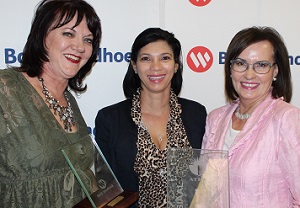
Youth Day tackles social ills
The promoters of Adult Literacy in Education from Stampriet in the Hardap Region are from the left: Jolanda Garises, Jeneveth Garises, Ronell Khaxas, Olivia Gaoses, Roseline Swartbooi and Jennifer Streidwolf. (Photograph by Hilmah Hashange)“We want the community to be able to read and write.”
The youth from more than eight constituencies in the Hardap Region gathered at the Mariental Sports Stadium to interact on a personal level and engage in various activities such as cultural performances, debate and sports as well as leisure activities. Their main concern was to find workable solutions for the typical problems the youth faces in rural areas.
The National Youth Council this year celebrated its 20th anniversary of addressing the challenges, opportunities and obstacles facing young people. This anniversary celebrations coincided with the annual Regional Youth Day which was hosted by the Hardap region and took place from 9 to 11 May in Mariental.
Established in 1994 with the aim of fostering among the Namibian youth a spirit of national identity, a sense of unity and self-respect, the National Youth Council has in the past two decades managed to create an in-depth awareness of social, economic, political, educational and cultural prospects and adversities amongst young people.
The Youth Day’s theme was “Youth Against Violence” and Gender Violence was the topic given for scrutiny and debate. The debating teams had to define Gender Violence, its effects in communities and offer solutions to control, prevent and eradicate it.
According to one participant, Jennifer Streidwolf from Stampriet, gender violence is very rampant in their community especially amongst the youth although cases are not reported to law enforcers. “Gender violence is an ongoing cycle in our community. You grow up watching your mother being abused by your father so to many children this kind of phenomenon is seen as a norm and will never die out,” Streidwolf lamented.
She attributed the high rate of unemployment to the increasing domestic violence in Stampriet. “There are many young girls in our community who come from impoverished families and end up leaving school because of financial difficulties. These girls in turn end up sleeping with older men for money and remain dependent on these men,” she added.
Streidwolf is of the opinion that if law makers can strengthen the law that is specific to gender violence, maybe a change will occur. “An abuser will argue that it is his human right to do whatever he feels like, that includes beating his wife or girlfriend but if proper laws are implemented then for sure, such violence might decrease. We need to empower women and create job opportunities for women to be independent and start making their own decisions,” she said.
Streidwolf is one of four Adult Literacy promoters in Stampriet who offer Basic English and Mathematics courses to adults in their community who have little or no education. “The reason for setting up such a course is to empower the illiterate community of Stampriet who did not complete their formal education. We want the community to be able to read and write and also be able to sign for their own documents and not always use finger prints as their form of signature,” Streidwolf said.
Apart from being adult literacy promoters, the youth of Stampriet have also established the Auob Youth against Crime, a youth choir club and will launch an Aids Awareness Club on 19 May. Streidwolf will act as chairperson for the club.
Seventeen year old Arnoldia Jantjies from Gochas, who said this is her first time attending a youth day, echoed Streidwolf’s sentiments and stressed that alcohol and drug abuse are the major problems amongst the youth of Gochas. Jantjies had this message for the youth: “I urge the youth to finish school and continue to further their studies because education is very important.”











































